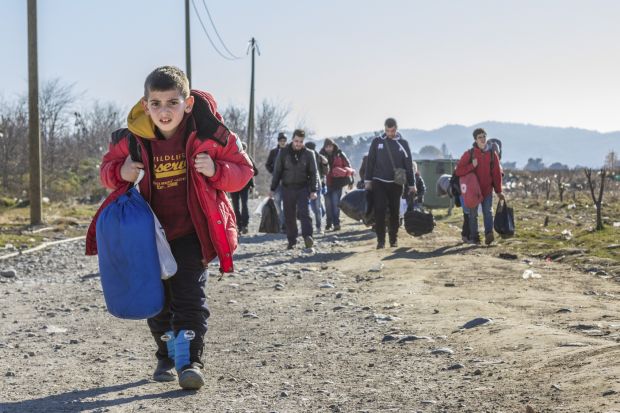The Central European University found itself “on a collision course” with Hungary’s anti-immigrant government when it decided to teach refugees, the institution’s president said.
As CEU – a graduate campus created in Budapest after the fall of communism – battles for its existence, Michael Ignatieff told an audience in London that one of the many points of conflict between his institution and the administration led by Prime Minister Viktor Orbán had been the university’s outreach work with asylum seekers now interned in camps on Hungary’s border.
Speaking at the University of East London on 26 April, Professor Ignatieff claimed that, in Hungary, “everyone who tries to help refugees is being criminalised”.
“This is not social work,” insisted Professor Ignatieff, a historian and human rights scholar, who has held senior academic posts at Harvard University and the universities of Cambridge, Oxford and Toronto, and served as leader of Canada’s Liberal Party between 2008 and 2011.
“We believe in these people [as students] one by one – these people have a right to education and we want to serve them,” he added.
The conflict with Hungary’s government over the education of refugees went to the heart of CEU’s “battle for academic freedom”, said Professor Ignatieff, who added that the university may be forced to leave Hungary by legislative amendments that “would make it impossible to stay”.
Under proposals by the Orbán government, CEU would not be able to issue US-accredited degrees, would need to open a New York campus, change its name and end an agreement whereby non-European Union staff do not need a work permit. Critics claim that the new law is an attempt to silence pro-democracy institutions, particularly those funded by billionaire George Soros, the Hungarian-born investor, who founded CEU.
As Professor Ignatieff addressed UEL students and staff, the EU announced that it would take legal action against Hungary, saying that the proposed law was not compatible with academic freedom.
A university “must be able to teach whoever they want to”, said Professor Ignatieff.
However, in a talk titled “The Refugee as an Invasive Other”, the Canadian academic explained how a “weird microbial language” normally used for describing invasive animal and plant species was now being used by Hungarian politicians to “dehumanise” refugees.
“I do not like giving credence to this language, I hate it…as when it is used, it makes the political answer seem obvious,” he said, adding that it “reframes politics so that only one solution is possible”.
Search our database for jobs in political science
CEU’s decision to bring about 50 refugees to its Budapest campus represented an effort to disrupt the narrative propagated in Hungary about these "mostly desperate people”, Professor Ignatieff contended.
Refugees would go from a “freezing tent on the frontier of Hungary, walk half an hour, get on a bus for two and a half hours” to attend two hours of classes at CEU before returning to the border camp, he said.
“If that is not hunger for higher education, I do not know what is,” he said, adding that “these are things that remind you what universities are really for”.
However, the government was now preventing refugees from leaving the camp under new internment rules, making CEU’s educational efforts far more difficult, said Professor Ignatieff.
“I have students in my classrooms who would not be there unless…[law lecturers] had not found out [that] they had a credible claim [for residency] and got them into our university,” he added.
Professor Ignatieff also praised UEL’s work with refugees, including its cooperation with CEU on the EU-funded Open Learning Initiative, in which short courses are delivered to migrants on campus.
“There are not a whole bunch of universities doing this, so we have to work together,” he said.
Register to continue
Why register?
- Registration is free and only takes a moment
- Once registered, you can read 3 articles a month
- Sign up for our newsletter
Subscribe
Or subscribe for unlimited access to:
- Unlimited access to news, views, insights & reviews
- Digital editions
- Digital access to THE’s university and college rankings analysis
Already registered or a current subscriber?








